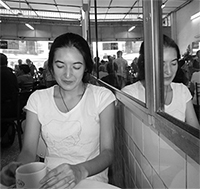Deadline EXTENDED to May 8, 2018 at Midnight!
Interview with the 2018 Novella Prize Winner
 Malahat Publicity Manager L'Amour Lisik talks with Samantha Jade Macpherson, whose story "Tattoo" was chosen for the $1,500 prize. Malahat Publicity Manager L'Amour Lisik talks with Samantha Jade Macpherson, whose story "Tattoo" was chosen for the $1,500 prize.
LL: I’m always interested in how stories grow. Most go through several iterations before they’re finalized. What was the first idea that spurred you to write this story? Was it always intended to be written as a novella?
SM: This story has been through many versions, all of them wildly different, but I’ve always been interested in the idea of the tattoo. At first it was more a meditation on art, and how much we are willing to give for it, but the final version buries that thread in favour of the bodily act of tattooing. Tattooing makes me think of ritualized or compartmentalized pain – because it’s pain that we choose for ourselves – and I find it a pretty interesting topic for fiction.
It wasn’t always meant to be a novella. “Tattoo” started out as a 4,000 word workshop story. Two years later it had ballooned to over 20,000 words. Another two years after that, I had cut it down to about 10,000. That’s where it stands now.
Read the full interview with Samantha Macpherson on our site.
Spring Issue Interview with Jason Emde on Creative Nonfiction
 Malahat interim editor Micaela Maftei talks with Jason Emde about paying attention, pilgrimage, and how living abroad can shape you as a person. Malahat interim editor Micaela Maftei talks with Jason Emde about paying attention, pilgrimage, and how living abroad can shape you as a person.
MM: There’s a moment in your piece where you write: “I’m working hard but I’m not really doing the work because I’m hoping the path will do it for me while I enjoy myself walking around.” What is the work that you are and aren’t doing in that moment?
JE: I think I was thinking about things like, what is the pilgrimage about? What does it mean? What do I want it to do? I don’t know if it’s a peculiarly Western problem or a human problem or a Jason Emde problem but, in Shikoku like everywhere else, I was battling noisy fretful monkey mind chatter: ‘You’re a chump! You f*cked up! You’re imperfect! Do something!’ There’s that urge to jump up and fix everything, to clang and hammer all night and day. To work. But Shunryu Suzuki says that the way to control your cow is to give it a large, spacious meadow; give it the space to move around, and watch it, and then you’re in control in the widest sense. A lot of the pilgrimage, for me, I think, was learning how to give the cow its space in the meadow. Weird work, in a way — work without working, almost — and I didn’t think I was doing enough. Do something! Hurry up! But just walking every day, sometimes as much as forty kilometres, with a heavy pack, up and down mountains — it starts to sort of murder a lot of the chatter and clutter in your skull, somehow. Things get very simple and primal and clean. “One does less and less until one does nothing at all, and when does nothing at all there is nothing that is undone.” That’s Lao Tzu.
Read the full interview with Jason Emde on our site.
|